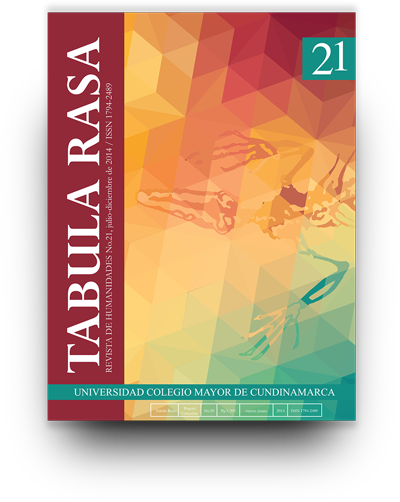«Somos afro-socialistas: marcos de acción colectiva y etno-racialización del movimiento rural afroyaracuyano en Veroes-Venezuela
«We are Afro-socialists»: frameworks for collective action and ethnoracialization of Afro-Yaracuyan rural movement in Veroes, Venezuela
Mostrar biografía de los autores
este artículo analiza los procesos de etno-racialización del movimiento rural afroyaracuyano del estado Yaracuy, Venezuela. Desde una perspectiva etnográfica se estudia cómo las organizaciones territoriales de este movimiento han generado nuevos marcos de acción colectiva que intentan movilizar tanto identidades étnico-raciales como identificaciones productivas/campesinas. Igualmente, se aborda cómo las diversas posiciones étnicas y raciales de las y los actores sociales están en constante articulación con los discursos y políticas del multiculturalismo bolivariano. Proponemos que la construcción de la diferencia étnico-racial en torno a la «afrodescendencia» no sólo está en continua disputa, sino que también se encuentra mediada por los discursos e imaginarios políticos del proyecto socialista venezolano.
Visitas del artículo 90 | Visitas PDF 73
Descargas
Alonso, A.M. 1994. “The politics of space, time and substance: state formation, nationalism, and ethnicity”. Annual Review of Anthropology. 23: 379-405.
Brondo, K. V. 2007. “Land loss and Garifuna women’s activism on Honduras’ north coast”. Journal of International Women’s Studies. 9 (1): 99-116.
Chávez, H. R. 2013. El libro azul. Caracas, Ediciones Correo del Orinoco. Della Porta, D. y M. Diani. 1999. Social movements: an introduction. Oxford, Blackwell Publishers.
Engle, K. 2010.The elusive promise of indigenous development: rights, culture, strategy. Durham, Duke University Press.
French, J. 2002. “Dancing for land: law making and the cultural performance in northeastern Brazil”. PoLAR. 25 (1): 19-36.
García, J. 2007. “La deuda del estado venezolano y los afrodescendientes”. The Journal of Latin American and Caribbean Anthropology. 12 (1): 223-232.
Goodwin, J. et al. 2001. “Introduction: why emotion matters”, en J. Goodwin et al. (eds.), Passionate politics. emotions and social movements. 1-26. Chicago, Chicago University Press.
Gordon, E., Gurdián, G. y Hale, C. 2003. “Rights, Resources, and the Social Memory of Struggle: Reflections on a Study on Indigenous and Black Community Land Rights on Nicaragua’s Atlantic coast”. Human Organization. 62 (4): 369-381.
Gow, D. y J. Rappaport .2002. “The indigenous public voice. The multiple idioms of modernity in native Cauca”, en K. Warren y J. Jackson (eds.), Indigenous movements, self-representations and the state in Latin America. 47-80. Austin, Texas University Press.
Grueso, L. et al. 1998. “The process of black community organizing in the southern Pacific coast region of Colombia”, en S. Álvarez et al. (eds.), Cultures of politics, politics of culture. Re-visioning Latin American social movements. 196-219. Boulder, Westview Press.
Guyot, S. 2011. “The instrumentalization of participatory management in protected areas: The ethnitization of participation in the Kolla-Atacameña region of the central andes of Argentina and Chile”. Journal of Latin American Geography. 10 (2): 9-39.
Hale, C. 2005. “Neoliberal multiculturalism: the remaking of cultural rights and racial dominance in Central America”. PoLAR. 28 (1): 10-28.
Hellebrandová, K. 2014. «El proceso de etno-racialización y resistencia en la era multicultural: ser negro en Bogotá». Universitas Humanística. 77: 145-168.
Hoffmann, O. 2002. “Collective memory and ethnic identities in the Colombian Pacific”. The Journal of Latin American Anthropology. 7(2): 118-139.
Holst, F. 2012. Ethnicization and identity construction in Malaysia. Nueva York, Routledge.
Hooker, J. 2005. “Indigenous inclusion/black exclusion: race, ethnicity and multicultural citizenship in Latin America”. Journal of Latin American Studies. 37 (2): 285-310.
Johnston, H. y J. Noakes. 2005. “Frames of protests: a road map to a perspective”, en H.
Johnston y J. Noakes (eds.), Frames of protest: social movements and the framing perspective. 1-32. Maryland, Rowman & Littlefield Publishers.
Linhares, L. F. 2004. “Kilombos of Brazil. Identity and land entitlement”. Journal of Black Studies. 34 (6): 817-837.
Nagle, J. 2009. Multiculturalism’s double bind: creating inclusivity, cosmopolitanism and
difference. Burlington, Ashgate Publishing Company.
Ng’weno, B. 2013. «¿Puede la etnicidad reemplazar lo racial? Afrocolombianos, indigenidad, y el Estado multicultural en Colombia». Revista Colombiana de Antropología. 49 (1): 71-104.
Oliver, P. y H. Johnston. 2005. “What a good idea! Ideologies and frames in social movement research”, en H. Johnston y J. Noakes (eds.), Frames of protest: social movements and framing perspective. 185-204. Maryland, Rowman & Littlefield Publishers.
Omi, M. y H. Winant.1994. Racial formation in the United States. From the 1960s to the 1990s. NY/Londres, Routledge.
Oslender, U. 2004. “Fleshing out the geographies of social movements: Colombia’s Pacific coast black communities and the ‘aquatic space’”. Political Geography. 23: 957-985.
Perozo, A. y B. Pérez. 2001. «La cara oculta de la pluriculturalidad: el caso de los afrovenezolanos». Memorias II Encuentro para la promoción y difusión del patrimonio folklórico de países andinos. Influencias africanas en las culturas tradicionales. 111-122. Santa Ana de Coro.
Restrepo, E. 2011. «Etnización y multiculturalismo en el bajo Atrato». Revista Colombiana de Antropología. 47 (2): 37-68.
Snow, D. y Benford R. 1992. “Master frames and cycles of protest”, en A. Morris y C. Mc Clurg (eds.), Frontiers in social movement theory. 133-155. New Haven, Yale University Press.
Speed, S. 2005. “Dangerous discourses: human rights and multiculturalism in neoliberal Mexico”. PoLAR. 28 (1): 29-51.
Wade, P. 1995 “Cultural politics of blackness in Colombia”. American Ethnologist. 22 (2): 341-357.
Wade, P. 1997. Race and ethnicity in Latin America. Critical studies on Latin America. Chicago, Pluto Press.
Wouters, M. 2001. “Ethnic rights under threat: the black peasant movement against armed groups’ pressure in the Chocó, Colombia”. Bulletin of Latin American Research. 20 (4): 498-519.








